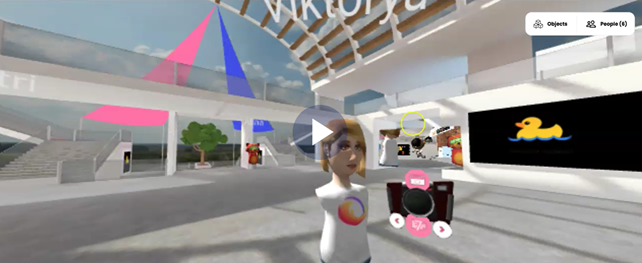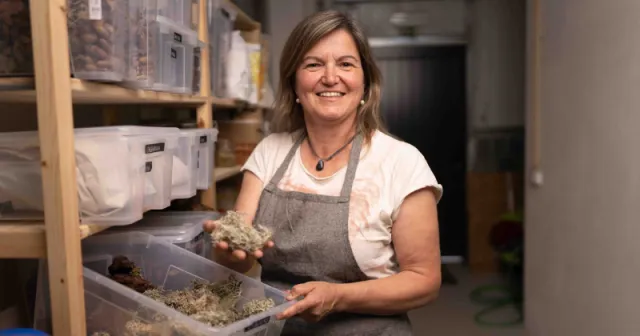One hackathon, many ideas: practices from Italy

Read more about the projects of the first Italian EPALE hackathon for adult education centres (CPIA) where many ideas were spread to support the educational and training needs of adult learners!
On the 9th and 10th November, the Epale Edu Hack took place. During the event-competition, teachers and students from CPIAs across Italy challenged each other in the design of digital learning environments for distance and in-presence teaching. Over the course of the two days, each team had the opportunity to face the other teams and be supported by mentors experienced in digital communication strategies, graphic design, digital storytelling, web, collaboration platforms and anything else that could support the participants’ projects.
Lauren Chmiel, from the Main stage of DigiEduHack in Ljubljana, the European event in which EPALE's hackathon takes part, made an appearance to encourage the participants before the start of the final phase of the competition.
The presentation of the projects, the challenges and the announcement of the three finalists chosen by the judges took place live on Facebook from the official EPALE Italia page. The panel - composed of Fulvio Ananasso, from Stati Generali dell'Innovazione, Elisabetta Cogotti, USR Sardegna - Area Formazione professionale, Educazione Adulti, Andrea Bedorin from All Digital AISBL, Lorenzo Guasti, research technologist at Indire and Annamaria Cacchione, researcher at Indire in the IdA sector - also wanted to pay special recognition to the project whose results were considered most in line with the criteria of inclusiveness, sustainability, sociality and sense of belonging to the community established by the Regulation.
The projects
The judges appreciated the great variety of proposals, in terms of the chosen themes, the transferability of the technological and IT solutions proposed and the response to the needs of the learners and the local community. The ability of the teams in completing their projects in such a short time was also noted.
The teams joined the event from several schools, where the students and teachers involved presented their work in a dynamic and positive, multilingual and multicultural environment. Each individual participant was the protagonist of a collective and participatory work, as is the case in a hackathon!
Brief description of the projects:
CPIA 2 Firenze - IDEAL CPIA

Development of a platform to effectively respond to eventual absences, emergencies and needs of adult learners. This environment is structured as an online laboratory space where students can socialise, meet and engage in individual and/or group study sessions, outside of school time. They can learn and debate the issues raised during the lessons or for study through packages of hours delivered in e-learning modules with technological support to be used in and outside of the actual classroom.
CPIA 4 Roma - #INTEGRA
A web App containing a wide range of content produced by teachers, students and local institutions. It can be used for orientation, integrated teaching, formal and non-formal learning. It also includes a section dedicated to students' portfolios indicating their educational paths, their skills and curriculum vitae.
CPIA Lecco - IL MONDO IN PIAZZA (THE WORLD IN THE SQUARE)

The students of the CPIA of Lecco, along with their teachers, have created a platform where you can publish content and videos, get information, help other students to understand aspects of everyday life and the world of school, find materials to search for a piece of work, and learn to use Google Apps and computer tools. The platform is divided into the following sections: School, Daily Life, Work and Technology.
Visit “Il mondo in piazza” (“The world in the square”) at http://ilmondoinpiazza.netsons.org/
CPIA Savona - Digital tools for the CPIA of the future: between communication and didactics
The project proposed by the Savona CPIA focuses on digital tools for the CPIA of the future from the perspective of storytelling, putting emphasis on the educational needs of students, teaching and access to digital services of the school and the territory. With digital storytelling the students can tell their stories, talk about the CPIA, guide other students and take part in “flipped” classes.
CPIA 2 Bergamo - PAROLE IN TASCA (WORDS IN THE POCKET)

The project “Parole in tasca” (“Words in the pocket”) has involved a team of students in the creation of a digital “pocket” dictionary of basic Italian that can be useful in everyday life, not only for those enrolled in literacy courses, but for anyone who wants to learn the Italian language. The words are grouped by theme, you can listen to the correct pronunciation and you can contribute to enriching the dictionary by inserting new words!
CPIA 3 Torino - O – MAPS
Starting from a standardised map, which shows a flat and aseptic territory, the students and teachers of the CPIA created a customised map that represents the territory that the students live in, told in their own words. The map primarily represents the area of Moncalieri and then parts of the city of Turin, mapping out the places of those who have just moved to the area, and of those who have lived there for longer and know it better. The students wrote the description of the place by themselves in Italian and added an audio in their mother tongue. The map will be used within the school and the reference link will be sent to newcomers who do not yet know the area in which they live.
Visit O-Maps at: http://u.osmfr.org/m/678007/
CPIA Napoli Città 2- SAME MISTAKES
The foreign students of the CPIA Napoli Città 2 retrace the common mistakes they make in using the Italian language due to the influence of their mother tongue or other spoken languages. “Same mistakes” is a future App that was created with the aim of helping foreign and migrant students to learn Italian without getting confused with the other languages they speak and to recognise “false friends”. The App can be downloaded free of charge by students and will be used in the classroom as a tool for inclusivity and sociality.
CPIA di Viterbo Roma – CPIAMICO TOGETHER WE CAN
CPIA students represent a rich variety of cultures, habits and traditions that must be protected, expressed and shared. This is the starting point of the CPIAMICO project, a digital CPIA which is always open and available, with activities and teaching resources uploaded on Moodle, a private Facebook group, a daily support network for anyone who needs it, an intercultural column created by the students to share life experiences and curiosities born from the encounter between their different cultures.
CPIA Terni 1 - RIDEFINIAMO(CI) WE REDEFINE

The project aims to bridge the gap between the labour market and the school world and formal education. The students identified their main needs and imagined their CPIA of the future, a CPIA connected to the territory, to training agencies, to work, a CPIA without barriers and with virtual learning spaces. The project uses Mozzilla's Hubs to create this virtual space of confrontation and interaction not only with the territory, but also with the national realities operating in the adult education sector. In the CPIA created with Hubs you will have access to a wide range of features to collaborate and communicate freely with other people who join the virtual space and decide to live a different experience from the one you normally experience with school learning.
CPIA BAT (Andria) – LE FAVE DI FEDERICO (FREDERICK BROAD BEANS)
Realisation of a “learning object” consisting of a video and a Canva presentation on the historical object of reference, namely Frederick II. This is far from the usual myths that have frequently been associated with him. Instead, this video describes the medieval dishes and recipes he loved to eat, his favourite being broad bean soup! The learning objective enhances the informal skills of the trainees, brings them closer to the culture and the territory in which they live, and facilitates their inclusion in the social fabric.
The territories
Many of the projects described above were carried out with the collaboration of institutions from the CPIAs' territory. All the projects reflect the need of adult learners, often of non-Italian nationality, to create a close link with the territory in which they live and work and, consequently, the role and potential that the CPIAs have as networks and as a service to the community.
The finalists
First place:
CPIA 2 Bergamo with the project “Parole in tasca” (“Words in the pocket”).
Second place:
CPIA Rome Viterbo with the project “CPIAmico for inclusion and digitalisation”.
Third place:
CPIA Fabrizio De André of Lecco with the project “Il mondo in piazza” (“The world in the square”).
The judges made a special mention to:
CPIA 3 Torino with the project “O-MAPS”, for the complete development of the innovative idea and the link with the territory. The collective and community map is a symbol of a school that builds a network, that exists in the territory, that lives it together with its students, that helps them find their way around and that includes everyone's contribution.
Epale Edu Hack. Let's design together the CPIA of the future was promoted by the EPALE Italy Unit in collaboration with EGInA Foligno and the Ridap ICT IdA National Purpose Network, and is part of the official events of DigiEduHack, the international event promoted by the European Commission that every year mobilises the educational community at all levels to enhance digital education.





Great initiative!
What I like about this hackathon is the practical approach and the fact that it is so widespread regionally.